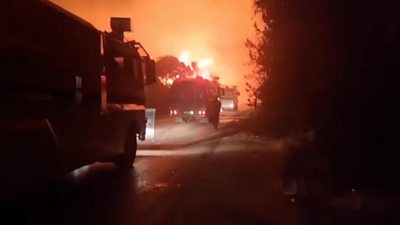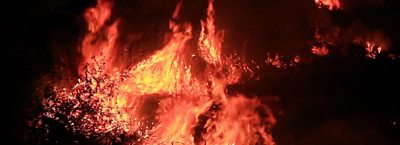Why didn’t we know? Why didn’t they tell us? Why didn’t we get the information? A lot happened before the fire got to us and we didn’t get the information.”
Tunisian schoolgirl Yasmina Gharbi and her family survived a forest fire which broke out in the region of Ain Draham, Tunisia in 2023. Around 500 people were displaced and hundreds of acres were burned to the ground, but she and her family received no prior warning. In July that year, with temperatures of around 50 degrees, wildfires killed at least 34 people in neighbouring Algeria, with thousands evacuated from their homes.
Extremely hot, dry summers leave the forested areas of North Africa highly susceptible to wildfires and the devastation that accompanies them. When wildfires strike, large areas of forest and farmland are destroyed, threatening local livelihoods, homes, ecosystems and, sometimes, human lives. As weather patterns continue to change and become increasingly unpredictable, people need reliable weather and climate information to prepare, cope and survive.
Imed – a local sailor who helped save people trapped by the fire, said, “Approximately 80% of Maloula’s forests were burnt to the ground. Large areas of forest. If we had got the information in advance, as sailors, we could have helped better. We could have provided the necessary aid alongside rescuing people.”

In Tunisia, Libya and Algeria, ��ѿ��ý Media Action’s WISER project looks at the role of media in raising awareness and improving preparedness for natural disasters such as wildfires and flooding. Through our research, we identified barriers to effective reporting on these issues, such as distrust of state broadcasters, and the importance of communication in local languages and real-time social media posts by local micro-influencers. Using these insights and collaborating with the local community, broadcasters and emergency services allowed us to develop more effective ways of communicating vital information to local audiences and reach over a million people.
Since then, we have expanded the project into neighbouring areas and worked with a wider range of partners in areas such as broadcasting, weather forecasting, civil protection and forestry, to share learnings and improve wildfire-related reporting across the region in anticipation of future climate events.
We work with local journalists and broadcasters to co-produce content in multiple languages, which reaches communities who depend on accurate, trusted climate information to make practical decisions about their lives and livelihoods.
Informed by our deep understanding of audiences and the power of media to communicate vital climate information to those who need it, we provide training to journalists and producers in the region, which enhances their ability to create tailored, relevant and engaging content on the issues facing local people.
We didn’t expect our whole beloved city to be on fire. We didn’t expect our lives to be in danger. We didn’t expect to see our whole entire house that we were raised in on fire. And we didn’t expect to not know whether we were going to survive or not.”
Through initiatives like the WISER project, which identify and share data and learnings to enhance early warning and action communication, we aim to ensure that people like Shams and her family have access to accurate, trusted weather information when they need it most.
Sharing our insights at IUCN
��ѿ��ý Media Action is an official media partner of the International Union for the Conservation of Nature's (IUCN) World Conservation Congress in Abu Dhabi. As part of the collaboration, we hosted a media pavilion throughout the Congress (9–13 October 2025), with contributions from the ��ѿ��ý Studios Natural History Unit (NHU) exploring how storytelling can inspire and inform audiences on the intertwined issues of threatened biodiversity and the changing climate.
Search by Tag:
- Tagged with Tunisia Tunisia
- Tagged with Middle East and North Africa Middle East and North Africa
- Tagged with Climate Action Climate Action
- Tagged with Resilience Resilience

